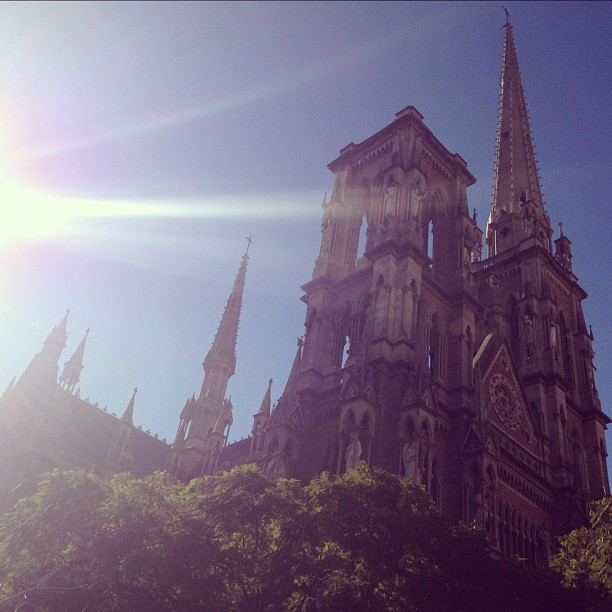Becoming Cordobesan
Having taken 3 years of Spanish in high school, receiving a minor in college, living in Panama for two years, and frequently visiting Latin America, I thought my Spanish language skills would be more than enough to survive a summer in Argentina. I am quickly starting to realize that Argentine Spanish is completely different from the Spanish I am used to. The forms. The accent. The vocabulary. Ashamedly, I barely studied the vosotros conjugations in school because I never thought I would use it. Once I discovered that vos is the preferred form here, I could just picture Señora Garcia shaking her head – reprimanding me for not paying more attention. I’ve known “parking lot” to be “estacionamento”, but here it is “playa”, which I knew to be “beach”. But it’s not pronounced like playa. In Argentina it’s more like pla-ja. It took my roommate and I about 15 minutes to figure out what palta was - it was all over the sushi menu. Turns out it’s avocado. Had to mark that one down – palta, not aguacate. But eventually you get used to it. You start referring to pens as lapiceras instead of plumas and strawberries as frutillas, not frescas. Suddenly, the other words begin to sound strange. I’ve even started to think in Spanish. Talking to people back home I couldn’t think of the word for realtor – all I could come up with was inmobiliaria.
While the language took some time to get used to, the Cordobesan schedule fit me like a glove. Most days start late by American standards – around 9 am. You wake up and have a small breakfast – usually a croissant (medialuna) and coffee. Head out to work around 10 am and by 3 pm it’s time for siesta and a large lunch. Back to work after a couple of hours and then comes a small afternoon meal (merienda) around 6. The workday ends around 7:30 or 8 pm, and dinner generally isn’t served until 9:30 or so. As a night owl, I can’t say I’m complaining. The one thing that I will say is good luck to all the vegetarians traveling to Argentina. This country is known for its beef and proud of it – as it should be. The high quality here is something that can only be obtained in the absence of the factory farming we have become so accustomed to in the United States. Besides the schedule and the beef, Cordoba is a beautiful city. The picture below is a church that I have the privilege of seeing out of my window every morning. The mix of gothic and modern architecture – old and new – makes for a fascinating aesthetic that I can definitely appreciate.

It seems to be a very interesting time economically and politically. The Sintonía Fina has caused a bit of economic turmoil this year. Removal of subsidies from utilities and other public services has led to rate increases. This is accompanied by growing inflation. The official estimates say inflation is only about 10%, but this agency is under presidential control. Other estimates put inflation anywhere from 20-30%. People are concerned, but as my realtor says, it’s nothing compared to the economic crisis Argentina experienced at the beginning of the millennium – a time when unemployment hovered around 20%. He was telling me that bread would be one price in the morning, and six times that price in the evening. Recently, the country has also set up harsh import regulations – requiring importers to export more than they import. These measures have also attempted to prohibit the purchase of dollars, leading to several “underground” dollar to peso exchange rings (believe me, it sounds a lot more exciting than it actually is). If you try to exchange currency at a bank, you’ll probably get around AR$ 4.5 for every dollar. But, the unofficial exchange rate is about $AR 5, and my boss tells me that the actual value is around 5.6:1. All of this is on top of the controversy surrounding the nationalization of the country’s oil. Opinions are mixed about President Kirschner’s administration. People appear hesitant to criticize at the moment, but they seem to be waiting with bated breath for the results of these recent decisions.
All that is to say that, while not working, there is plenty to do, see, and experience. I’m excited to see everything this city and country has to offer during the rest of my time here.